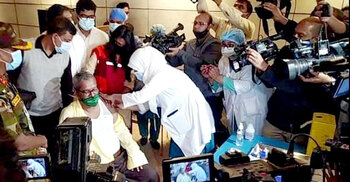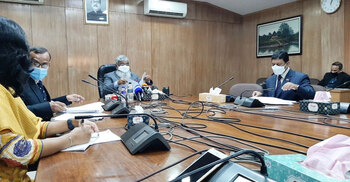Myanmar coup: Police use water cannon as thousands strike

Police in Myanmar's capital Nay Pyi Taw have used water cannon on workers conducting a nationwide strike against a military coup.
Thousands are taking part in a third day of street protests, calling for the release of elected leader Aung San Suu Kyi and for democracy to be restored, reports BBC.
State TV has warned protesters that action will be taken if they threaten public safety or the "rule of law".
It comes a day after Myanmar saw its largest protest in more than a decade.
Last week the military seized power after claiming without evidence that an earlier election was fraudulent.
They also declared a year-long state of emergency in Myanmar, also known as Burma, and power has been handed over to commander-in-chief Min Aung Hlaing.
Ms Suu Kyi and senior leaders of her National League for Democracy Party (NLD), including President Win Myint, have been put under house arrest.
'We aren't going to work'
By Monday morning, tens of thousands of people had gathered in Nay Pyi Taw for the strike, with other cities such as Mandalay and Yangon also reporting significant numbers, according to BBC Burmese. The protesters include teachers, lawyers, bank officers and government workers.
A video of the police water cannon being activated in Nay Pyi Taw appears to show protesters rubbing their eyes and helping one another after being soaked.
Kyaw Zeyar Oo, who took the video, told the BBC that two vehicles sprayed protesters with "no prior warning", while "the crowd was peacefully protesting in front of [the police]".
He added that by Monday afternoon, the situation was "totally calm" as crowds continued to gather, but the water cannon vehicles were still present.
A few injuries were reported but there were no other reports of violence elsewhere.
Online there had been calls asking workers to skip work to protest.
"This is a work day, but we aren't going to work even if our salary will be cut," one protester, 28-year-old garment factory worker, Hnin Thazin, told news agency AFP.
The BBC's South East Asia correspondent Jonathan Head says the massive rallies over the weekend have given new momentum to those opposing last week's coup, although there are still no clear leaders - for now it is a spontaneous and locally organised show of defiance.
The police also appear confused over how they should deal with the crowds which have completely outnumbered them, says our correspondent.
Last week, Myanmar's military seized control following a general election which saw the NLD party win by a landslide.
The armed forces had backed the opposition, who were demanding a rerun of the vote, claiming widespread fraud.
The election commission said there was no evidence to support these claims.
The coup was staged as a new session of parliament was set to open.
The military has replaced ministers and deputies, including in finance, health, the interior and foreign affairs.
It also blocked access to Facebook, which is widely used across the country, Twitter and Instagram.
But that failed to stop large nationwide protests on Saturday and Sunday - which saw the country's largest protests since the so-called Saffron Revolution in 2007, when thousands of the country's monks rose up against the military regime.







